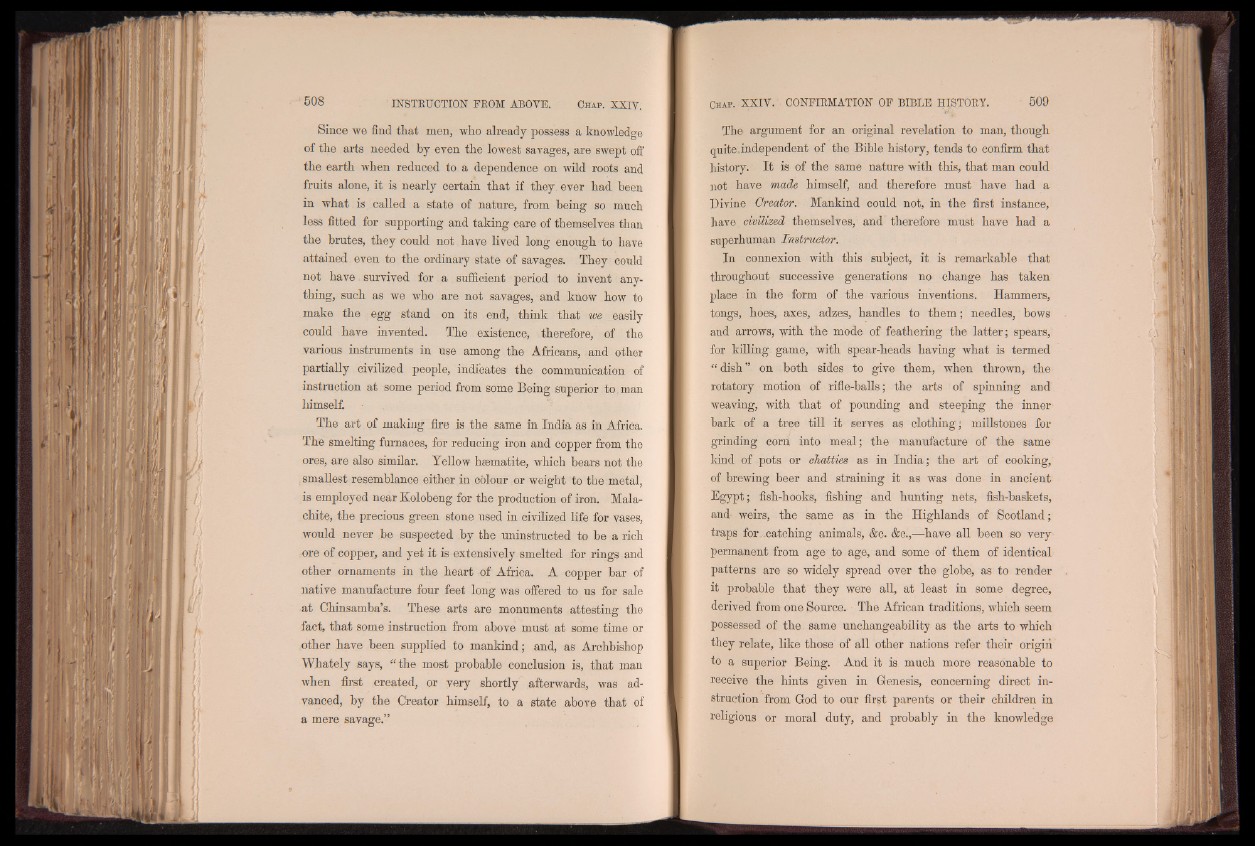
Since we find that men, who already possess a knowledge
of the arts needed by even the lowest savages, are swept off
the earth when reduced to a dependence on wild roots and
fruits alone, it is nearly certain that if they, ever had been
in what is called a state of nature, from being so much
less fitted for supporting and taking care of themselves than
the brutes, they could not have lived long enough to have
attained even to the ordinary state of savages. They could
not have survived for a sufficient period to invent any-
thing, such as we who are not savages, and know how to
make the egg stand on its end, think that we easily
could have invented. The existence, therefore, of the
various instruments in use among the Africans, and other
partially civilized people, indicates the communication of
instruction at some period from some Being superior to man
himself.
The art of making fire is the same in India as in Africa..
The smelting furnaces, for reducing iron and copper from the
ores, are also similar. Yellow hæmatite, which bears not the
smallest resemblance either in colour or weight to the metal,
is employed near Kolobeng for the production of iron. Malachite,
the precious green stone used in civilized life for vases,
would never be suspected by the uninstructed to be a rich
-ore of copper, and yet it is extensively smelted for rings and
other ornaments in the heart of Africa. A copper bar of
native manufacture four feet long was offered to us for sale
at Chinsamba’s. These arts are monuments attesting: the
fact, that some instruction from above must at some time or
other have been supplied to mankind; and, as Archbishop
Whately says, “ the most probable conclusion is, that man
when first created, or very shortly afterwards, was advanced,
by the Creator himself, to a state above that of
a mere savage.”
The argument for an original revelation to man, though
quite.independent of the Bible history, tends to confirm that
history. I t is of the same nature with this, that man could
not have made himself, and therefore must have had a
Divine Creator. Mankind could not, in the first instance,
have. civilized themselves, and therefore must have had a
superhuman Instructor.
In connexion with this subject, it is remarkable that
throughout successive generations no change has taken
place in the form of the various inventions. Hammers,
tongs, hoes, axes, adzes, handles to them ; needles, bows
and arrows, with the mode of feathering the latter; spears,
for killing game, with spear-heads having what is termed
“ dish” on both sides to give them, when thrown, the
rotatory motion of rifle-balls; the arts of spinning and
weaving, with that of pounding and steeping the inner
bark of a tree till it serves as clothing; millstones for
grinding cord into meal; the manufacture of the same
kind of pots or chatties as in India; the art of cooking,
of brewing beer and straining it as was done in ancient
Egypt ; fish-hooks, fishing and hunting nets, fish-baskets,
and weirs, the same as in thè Highlands of Scotland;
traps for .catching animals, &c- &c.,—have all been so very
permanent from age to age, and some of them of identical
patterns are so widely spread over the globe, as to render
it probable that they were all, at least in some degree,
derived from one Source. The African traditions, which seem
possessed of the same unchangeability as the arts to which
they relate, like those of all other nations refer their origin
to a superior Being. And it is much more reasonable to
receive the hints given in Genesis, concerning direct instruction
from God to our first parents or their children in
religious or moral duty, and probably in the knowledge